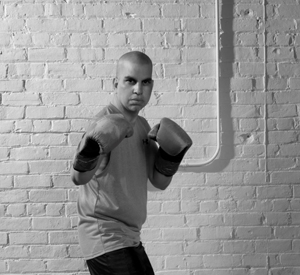Breast Cancer Survivor
Raising Awareness to Increase Support
 While he was battling breast cancer, Steve Del Gardo discovered something almost as shocking as his Stage II diagnosis. The world of breast cancer was focused almost entirely on women. Now he’s cancer-free and doing his part to raise awareness for male breast cancer survivors by leading Protect the Pecs, an organization where men can receive support and know they are not alone in their fight.
While he was battling breast cancer, Steve Del Gardo discovered something almost as shocking as his Stage II diagnosis. The world of breast cancer was focused almost entirely on women. Now he’s cancer-free and doing his part to raise awareness for male breast cancer survivors by leading Protect the Pecs, an organization where men can receive support and know they are not alone in their fight.
I was 44 when I first felt a lump in my left pectoral area. My primary care doctor referred me to a well-known breast care institute nearby. At my first appointment, the receptionist gave me several forms to fill out. I couldn’t believe that all of the questions were geared toward women, asking about menstrual cycles, gynecologists and most recent mammograms. Even the sign outside read “Wellness Center for Women.” All I could do was sign and date the forms.
I had a mammogram and ultrasound and after reading my test results, my doctor recommended a biopsy. A week later, the results came back benign. He told me to come back in six months if the lump hadn’t disappeared. Instead of disappearing, it got bigger and painful but I trusted him, so I waited. I went back after six months, and he recommended a lumpectomy immediately.
When the biopsy results came back as Stage II breast cancer, I was shocked because I thought it was a fatty deposit. I did not expect a cancer diagnosis. My doctor recommended a mastectomy. I asked him about taking both breasts, but he said typically 90 percent of men don’t get it in the other breast. I told him I’m not a typical guy. I had a double mastectomy later that month.
After those two surgeries in November, I thought I was done with treatment. My doctor said there was a 30 percent chance of recurrence within five years, and I thought those were pretty good odds. He disagreed and recommended chemotherapy. Even though I really didn’t want chemotherapy because of everything I’d read, I took four rounds once every three weeks. I lost the hair on my head and my goatee. Some side effects were bad, especially the nausea and bone pain, but I got through it with great support from my family and friends. My hair grew back a little darker and a little wavier, and I lost 55 pounds, so those are two plusses.
During treatment, I got frustrated with the lack of resources out there for guys with breast cancer. I didn’t know anything about breast cancer, and when I did find something online, it was just a footnote. There were no support groups, and there was no one for me to talk to. That’s when I decided to start Protect the Pecs. I’d been through the pain and suffering, and I knew I could do a lot for male breast cancer survivors and their families.
Through Protect the Pecs, I am raising awareness about male breast cancer by telling my story at corporations, colleges and conferences. Not surprisingly, my audiences are usually made up of women because men are embarrassed about having breast cancer. I tell them not to worry about the word “breast”—just call it chest cancer or pec cancer. Women usually make doctor’s appointments for their husbands and sons so, by educating them, I’m also educating the men in their lives.
When I speak, I stay away from the doom and gloom. I was never that sort of person before, and I’m still not. Instead, I’m open and honest, and I use humor because laughter is one of the keys to recovery. Hearing about the first time I had a mammogram and how I ate hot wings before chemotherapy puts people at ease. I also mention things I’ve done that I never could’ve done before I had cancer, like speaking in front of big audiences and throwing out the first pitch at a Cincinnati Reds game without being terrified.
A lot of people are so very angry about having cancer. When I talk to them one on one, I tell them cancer is just a hiccup in their lives. Blaming and being negative doesn’t help. If you’re negative, I believe your body will get sick. When I was diagnosed, my dad told me to be positive and keep moving forward, that I’d get through it. Instead of lying face down in the fight against cancer, I came out swinging, using all my strength, positivity, faith and humor to beat it down.


